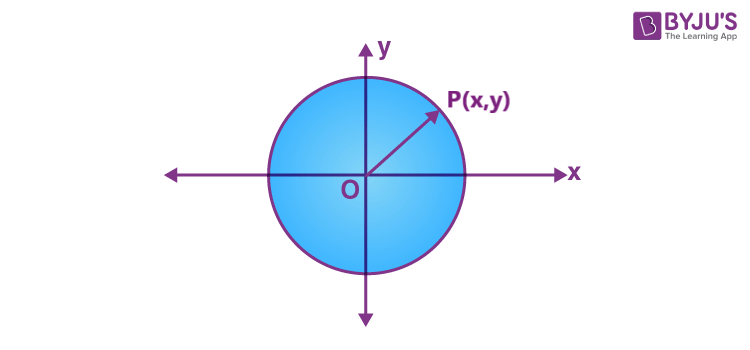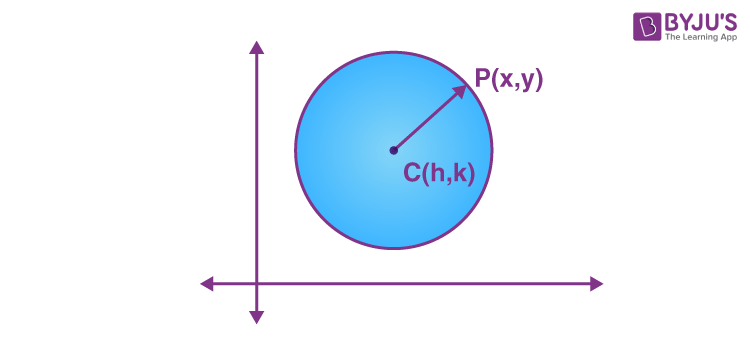General Form Equation of a Circle Drawer
The standard equation of a circle is given by:
(ten-h) ii + (y-chiliad) 2 = r 2
Where (h,one thousand) is the coordinates of middle of the circle and r is the radius.
Before deriving the equation of a circle, let us focus on what is a circle? A circumvolve is a fix of all points which are every bit spaced from a fixed point in a aeroplane. The fixed point is called the center of the circumvolve. The distance betwixt the center and any point on the circumference is called the radius of the circle. In this article, we are going to discuss what is an equation of a circle formula in standard form, and observe the equation of a circle when the center is the origin and the center is non an origin with examples.
What is the Equation of a Circumvolve?
A circumvolve is a closed curve that is drawn from the stock-still point called the center, in which all the points on the curve are having the same distance from the center point of the center. The equation of a circle with (h, thou) centre and r radius is given by:
(x-h) 2 + (y-thousand) 2 = r 2
This is the standard form of the equation. Thus, if we know the coordinates of the center of the circle and its radius as well, we can easily notice its equation.
Example: Say point (ane,2) is the center of the circle and radius is equal to 4 cm. Then the equation of this circumvolve will be:
(x-1) 2 +(y-ii) ii = 4 2
(10 2 −2x+i)+(y 2 −4y+4) =sixteen
X two +y two −2x−4y-11 = 0
Function or Not
We know that there is a question that arises in case of circumvolve whether beingness a function or not. It is clear that a circumvolve is non a function. Because, a role is defined past each value in the domain is exactly associated with one signal in the codomain, simply a line that passes through the circle, intersects the line at 2 points on the surface.
The mathematical way to describe the circle is an equation. Here, the equation of the circle is provided in all the forms such as general class, standard form forth with examples.
Equation of a Circumvolve When the Centre is Origin

Consider an arbitrary point P ( x , y ) on the circle. Let ' a' be the radius of the circumvolve which is equal to O P .
We know that the distance between the signal ( ten , y ) and origin ( 0 , 0 ) can be establish using the distance formula which is equal to-
√[ x2 + y 2 ]= a
Therefore, the equation of a circle, with the heart as the origin is,
xii + y 2 = a two
Where "a" is the radius of the circle.
Culling Method
Let us derive in some other way. Suppose (x,y) is a point on a circumvolve, and the middle of the circumvolve is at origin (0,0). At present if nosotros draw a perpendicular from point (x,y) to the x-axis, then nosotros become a right triangle, where radius of the circle is the hypotenuse. The base of the triangle is the distance along x-axis and height is the altitude along the y-axis. Thus, by applying the Pythagoras theorem here, we get:
x ii +y two = radius ii
Equation of a Circle When the Centre is not an Origin

Let C ( h , thousand ) be the center of the circle and P ( x , y ) exist whatever indicate on the circle.
Therefore, the radius of a circle is CP.
Past using distance formula,
(10-h) 2 + (y-k) 2 = CP 2
Let radius be 'a'.
Therefore, the equation of the circle with center (h, thousand)and the radius 'a' is,
(x-h) 2 +(y-k) 2 = a 2
which is called the standard form for the equation of a circle.
Full general form of Equation of a Circle
The general equation of any type of circumvolve is represented by:
10 two + y 2 + 2 g x + ii f y + c = 0 , for all values of g , f and c .
Adding g 2 + f 2 on both sides of the equation gives,
10 2 + 2 1000 x + one thousand 2 + y 2 + 2 f y + f 2 = g 2 + f 2 − c ………………(1)
Since, ( x + one thousand ) 2 = x 2 + two thousand x + grand two and ( y + f ) 2 = y 2 + ii f y + f ii substituting the values in equation (1), we have
( 10 + g ) ii + ( y + f ) 2 = g ii + f 2 − c …………….(2)
Comparing (2) with ( 10 − h ) 2 + ( y − k ) 2 = a 2 , where ( h , k ) is the centre and ' a' is the radius of the circle.
h = − g , k = − f
a 2 = m 2 + f 2 − c
Therefore,
x 2 + y 2 + 2 g x + ii f y + c = 0 , represents the circle with centre ( − yard , − f ) and radius equal to a 2 = g 2 + f 2 − c .
- If one thousand ii + f ii > c , and so the radius of the circumvolve is real.
- If g 2 + f 2 = c , and so the radius of the circle is nothing which tells us that the circle is a bespeak that coincides with the center. Such a blazon of circle is chosen a indicate circle
- g ii + f 2 < c , and then the radius of the circumvolve become imaginary. Therefore, it is a circle having a real centre and imaginary radius.
Polar Equation of a Circumvolve
To discover the polar class of equation of a circle, supercede the value of 10 = r cos θ and y = r sin θ, in x2 + yii = a2.
Hence, we get;
(r cos θ)2 + (r sin θ)2 = a2
r2 cos2 θ + rtwo sin2 θ = a2
rii (cos2 θ + sin2 θ) = a2
r2 (1) = a2 [Using trigonometry identity]
r = a
is the polar equation of a circumvolve with radius a and center at the origin (0,0).
Other Circle Formulas
Here are some formulas are given for circle in terms of radius.
| Diameter | 2 10 radius |
| Circumference | 2π (radius) |
| Area | π(radius) ii |
How to Find the Equation of the Circumvolve?
To find the equation of a circle given the radius and center of the circle, we can straight put the values in the standard course of the equation.
(x-h) 2 + (y-1000) 2 = r 2
Here, some solved problems are given to find the equation of a circumvolve in both cases such as when the center of a circle is origin and centre is not an origin is given below.
Solved Examples
Example ane:
Consider a circumvolve whose center is at the origin and radius is equal to viii units.
Solution:
Given: Middle is (0, 0), radius is viii units.
We know that the equation of a circle when the middle is origin:
xii + y 2 = a ii
For the given status, the equation of a circle is given equally
x2 + y 2 = 8 ii
xtwo + y two = 64, which is the equation of a circumvolve
Instance ii:
Detect the equation of the circumvolve whose center is (3,5) and the radius is 4 units.
Solution:
Hither, the center of the circle is not an origin.
Therefore, the general equation of the circle is,
(x-iii) 2 + (y-v) 2 = 4 2
x 2 – 6x + 9 + y 2 -10y +25 = xvi
x ii +y 2 -6x -10y + xviii =0
Example 3:
Equation of a circumvolve is ten 2 + y 2 − 12 x − 16 y + nineteen = 0 . Find the centre and radius of the circle.
Solution:
Given equation is of the form x 2 + y 2 + 2 g 10 + two f y + c = 0 ,
2 thou = − 12 , two f = − xvi , c = 19
chiliad = − six , f = − 8
Centre of the circle is ( half dozen , 8 )
Radius of the circumvolve = √[ ( − 6 ) 2 + ( − eight ) ii − 19 ]= √[ 100 − nineteen] =
= √81 = 9 units.
Therefore, the radius of the circumvolve is 9 units.
To know more about circles download BYJU'Southward – The Learning App to learn with ease.
Oftentimes Asked Questions on Equation of a Circumvolve
What is the equation for a circle?
The equation for a circle is given by:
(x-h)2+(y-k)2 = a2
Where (h,chiliad) is the center and a is the radius of the circle.
What are the formulas for circles?
The circumference of a circle is equal to 2 (pi) of radius or pi of bore.
The area of a circle is equal to the pi of radius-squared.
What is the equation of a circle when the center is at the origin?
At origin, the value of coordinates is (0,0), therefore, the equation of circle becomes:
(x-0)2 + (y-0)2 = r2
xtwo + y2 = r2
If (x-4)2+(y+7)ii=9 is the equation of circle, then what is the center of circumvolve?
Given, (ten-4)2+(y+seven)2=9 is the equation of circumvolve. If we compare this equation with the standard equation we become:
(x-h)2+(y-g)2 = aii
h=four and y = -vii
Therefore, (4,-7) is the center of circle
How do we know if an equation is the equation of circle?
If 10 and y are squared and the coefficient of x2 and y2 are same, then it is equation of circumvolve. For instance, 3x2+3y2 = 12 is a circumvolve'south equation.
chamberlindinto1985.blogspot.com
Source: https://byjus.com/maths/equation-of-a-circle/